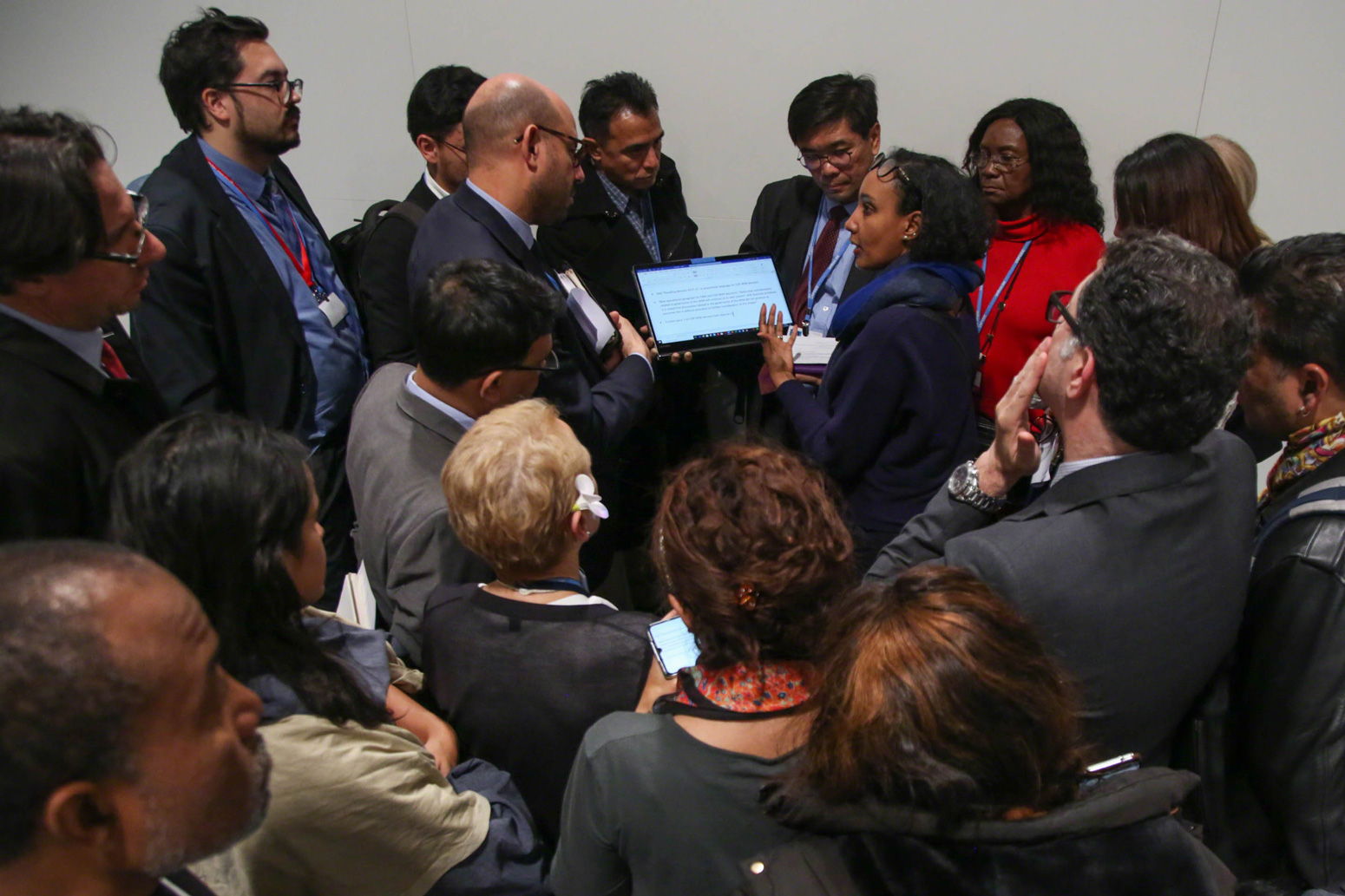COP25: Small Island States Rally Together to Secure ‘Best Possible Outcome’
OECS Media Release
At its conclusion, on the afternoon of Sunday 15 December, and by the time the Parties adopted the final decision, this year’s 25th Conference of Parties to the United Nations Framework Convention on Climate Change (COP-25) had earned the distinction of being the longest on record.
Originally scheduled to take place in Santiago, Chile from 2-13 December, the COP was moved to Madrid, Spain due to anti-government protests in the host country. Still under the presidency of Chile, the conference brought together an estimated 27,000 persons to Spain.
The "Chile-Madrid Time for Action" decision, agreed on Sunday, is considered by many to be a compromise deal. This is because, with respect to greenhouse gas emission reductions, the decision falls far short of what is required, according to the latest science, to keep global warming below 1.5 degrees Celsius.
The agreement was only achieved after unprecedentedly contentious negotiations, which saw big emitters being accused of stalling progress, and against the backdrop of the impending withdrawal of one major emitter from the Paris Agreement.
At a Ministerial Briefing hosted by the Alliance of Small Island States (AOSIS), Grenada’s Minister of Environment, Hon. Simon Stiell, lamented
“The developed world and large like-minded developing countries lack ambition and it costs lives, threatens our cultures and erodes our homelands.”
Many anticipated deliverables did not materialise due to the failure of Parties to reach consensus. One such example was the failure to agree on Article 6 of the Paris Agreement, which deals with carbon markets. This issue, along with other key matters such as transparency and some aspects of loss and damage, has been pushed to 2020.
Commenting on the outcomes of COP-25, Laurence Tubiana, one of France’s lead negotiators on the Paris Agreement stated,
"Major players who needed to deliver in Madrid did not live up to expectations but thanks to a progressive alliance of small island states, European, African and Latin American countries, we obtained the best possible outcome, against the will of big polluters."
One of the few bright spots in this year’s negotiation process was the creation of an opening for financing for loss and damage — a major issue for particularly vulnerable countries, such as the island nations of the Caribbean, to be considered by the Green Climate Fund (GCF).
The OECS at COP-25
All six OECS Member States party to the United Nations Framework Convention on Climate Change (UNFCCC) and the Paris Agreement were represented in Madrid, namely Antigua and Barbuda; the Commonwealth of Dominica, Grenada, St. Kitts and Nevis, Saint Lucia and St. Vincent and the Grenadines.
The OECS Commission was represented at COP-25 by a three-member delegation. Over the two-week period, members of the delegation participated, as panellists, in approximately twelve side events.
The OECS Commission also jointly organised, partnered and supported the following COP-25 events:
- A side event on Forecast–based Action (FbA), jointly organised with the French Development Agency (AFD);
- A side event on Human Mobility in the Context of Climate Change, jointly organised with the German development agency, GIZ.
- Through the Caribbean NDC Finance Initiative (NDCFI), the OECS Commission partnered with the Regional Pacific NDC Hub on a side event addressing the issue of Accelerating NDC Implementation and Enhancing Ambition through Regional Collaboration among Island States, with GIZ support.
- The Commission also co-supported a side event on “Climate-resilient transport infrastructure for sustainable trade, tourism, and development in SIDS” which was co-organised by UNCTAD and UNEP.
Despite the aggressive negotiation process, delegation members met bilaterally with various development partners and, in so doing, strengthened existing partnerships and laid the groundwork for several new alliances which will be pursued in the near future.
The OECS delegation also mounted and maintained a booth within the AOSIS/CARICOM Pavillion, which served as a useful locus for the sharing of information about the OECS and its work.
On the heels of COP-25, the OECS Commission has partnered with the Healthy Caribbean Coalition (HCC) to launch the first Lancet Countdown in the Caribbean — in an effort to raise the profile and stimulate action on climate change and health in the region.
The HCC Launch Event will be held in Barbados on Thursday, 19 December 2019 from 9:00 am and can be viewed live on the OECS Facebook Page.

 Crispin d'Auvergne, Coordinator for Climate Change and Disaster Risk Management in the OECS, addresses gathering at the Regional Pacific NDC Hub side event.
Crispin d'Auvergne, Coordinator for Climate Change and Disaster Risk Management in the OECS, addresses gathering at the Regional Pacific NDC Hub side event. Coordinator for Climate Change and Disaster Risk Management in the OECS, Crispin d'Auvergne, speaks at Risk Informed Early Action Partnership side event - COP25.
Coordinator for Climate Change and Disaster Risk Management in the OECS, Crispin d'Auvergne, speaks at Risk Informed Early Action Partnership side event - COP25. Josette Edward-Charlemagne, Programme Officer in the OECS Environmental Sustainability Cluster, participates in COP25 side event on Improving Resilience of Key Infrastructure in the Caribbean.
Josette Edward-Charlemagne, Programme Officer in the OECS Environmental Sustainability Cluster, participates in COP25 side event on Improving Resilience of Key Infrastructure in the Caribbean. Chamberlain Emmanuel, Head of the OECS Environmental Sustainability Cluster; and Crispin d'Auvergne, Coordinator for Climate Change and Disaster Risk Management in the OECS, participate in a panel discussion on Human Mobility in the Context of Climate Change on the sidelines of COP25.
Chamberlain Emmanuel, Head of the OECS Environmental Sustainability Cluster; and Crispin d'Auvergne, Coordinator for Climate Change and Disaster Risk Management in the OECS, participate in a panel discussion on Human Mobility in the Context of Climate Change on the sidelines of COP25.

